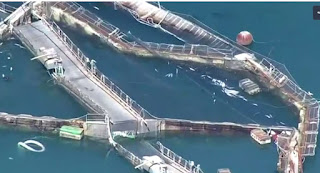[Update 3/14 - Corrected link to Mr. Gates comments.
https://www.youtube.com/watch?v=IgsSy6IsdhA&feature=youtu.be&t=1706]
[Update 12/14 4:10PM - Click here to submit comments to Clallam County on their proposal to ban salmon net pens through their Shoreline Master Program Update. Emphasize local interests are more important than those of Canadian based Cooke Aquaculture, the only company with these operations. If Cooke wishes to continue, upland facilities can be used.]
DOE Tim Gates telling Mason County
SMP Updates are the result of
a "community conversation" asking
"what do you want your community to look like."
Whose local interests does DOE really care about?
At a meeting where Mason County adopted its Shoreline Master Program Update, the Department of Ecology's Tim Gates stood before the Commissioners, speaking for DOE, to tell them what a Shoreline Master Program was supposed to represent. In his presentation, he stressed again and again how this was the result of a "community conversation" reflecting what citizens wanted their "commu/nity to look like". Mr. Gates went further, telling Commissioners SMP Updates are "always flavored by local interests."
Local citizens' expressed clearly and strongly:
We don't want this.
DOE response? Too bad.
Canadian based Cooke Aquaculture does.
Canada's Cooke Aquaculture is not a local Clallam County citizen
Apparently, the local interests which DOE cares about are not the local citizens, those citizens paying taxes, living in the counties adapting SMP Updates, and who elect government representatives to reflect their interest; citizens who turned out in overwhelming numbers to testify against open pen Atlantic salmon farming. Instead, local interests appear to be controlled by a Canadian company called Cooke Aquaculture. As reported in the Peninsula Daily News:
Ecology Regional Shoreline Planner Michelle McConnell told commissioners that Clallam County’s draft shoreline plan would likely be rejected by Ecology if it banned in-water net pen aquaculture. [Read Peninsula Daily News article by clicking here]
"You'll like this. It was baked in an oven
controlled by Washington laws."
No, we don't like it and it's time to change.
Get involved - get the cake out of this oven and start over.
For too long agencies have simply believed aquaculture is "baked in" to Washington's regulations and have allowed an exponential increase in industrial activities to take place in Washington's public waters. Those regulations have burned the public's cake. Washington's public waters are not a blank slate for foreign or local corporations to generate profits from. These are public waters to be preserved, protected, and restored for the benefit of all citizens. Not to generate profits for a few corporations, local or foreign. Tell your local officials it's time to cancel Cooke's leases and time to get strong regulatory oversight in place. Your grandchildren will thank you.
Contact your elected officials and tell them preserving Washington's public waters are more important than profits of a few corporations:
Elected representatives:
http://app.leg.wa.gov/DistrictFinder/



































